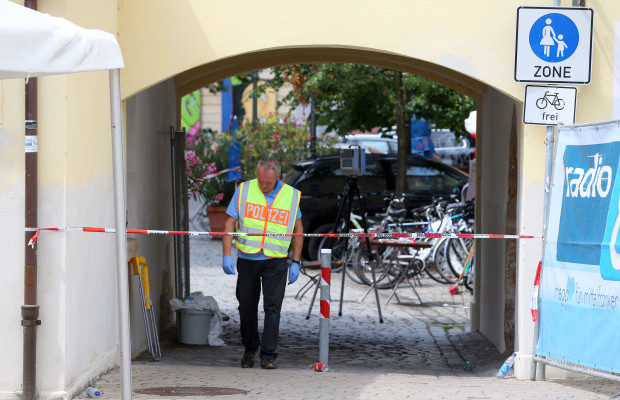ISIS claims second German attack in a week

A member of the German police stands behind a police tape in Ansbach, Germany, Monday, July 25, 2016, near the site where a failed asylum-seeker from Syria blew himself up and wounded 15 people after being turned away from an open-air music festival in southern Germany. The man recorded a cell phone video of himself pledging allegiance to the Islamic State group before he tried to get into the outdoor concert with a bomb-laden backpack. AP
ANSBACH, Germany — A Syrian asylum seeker who blew himself up outside a German music festival had made a video pledging allegiance to the Islamic State of Iraq and Syria (ISIS) group, authorities said Monday, in the second attack claimed by the jihadists in Germany in a week.
The 27-year-old assailant wounded 15 people, four of them seriously, near a cafe in the southern city of Ansbach on Sunday night when he set off a bomb in his rucksack, killing himself.
READ: Bomb kills likely attacker — German police | Syrian refugee kills woman in Germany machete attack
“A video made by the assailant was found on his mobile phone in which he threatened an attack,” Bavarian state interior minister Joachim Herrmann told reporters.
“After that he announced in the name of Allah that he pledged allegiance to (ISIS chief) Abu Bakr al-Baghdadi, the well-known Islamist leader, and announced an act of revenge against Germans because they were standing in the way of Islam.”
Article continues after this advertisementISIS later said via the jihadist-linked Amaq news agency that the attacker “was a soldier of the Islamic State” who had acted “in response to calls to target nations in the coalition fighting” the extremists.
Article continues after this advertisementEurope’s economic powerhouse was already reeling after four passengers and a passer-by were wounded in an axe attack on a train in Wuerzburg on July 18 which ISIS also claimed.
Then on Friday, nine people were killed in a shopping centre shooting spree in Munich by a German-Iranian teenager with a history of psychological problems but no apparent links to Islamists.
Already steeped in grief and shock, Germans were further rattled by news that a Syrian refugee had killed a 45-year-old Polish woman with a large kebab knife at a snack bar in the southwestern city of Reutlingen on Sunday.
Police, who had initially said the murder weapon was a machete, concluded that the incident in which three others were injured was likely a “crime of passion”.
Three of the four brutal incidents were in Bavaria, the southern state which has been a gateway for tens of thousands of refugees under Chancellor Angela Merkel’s liberal asylum policy.
Merkel’s deputy spokeswoman Ulrike Demmer expressed the government’s “shock” after the rash of attacks but also warned against branding all migrants a security threat.
“Most of the terrorists who carried out attacks in recent months in Europe were not refugees,” she told reporters.
“The terrorism threat (among refugees) is not larger or smaller than in the population at large.”
‘Friendly, inconspicuous’
Police said the Syrian man intended to target the open-air festival attended by 2,500 people but was turned away as he did not have a ticket, and detonated the device outside a nearby cafe.
“If he had made it inside, there would certainly have been more victims,” a police spokesman said.
The attacker, who came to Germany two years ago but had his asylum claim rejected after a year, had tried to kill himself twice in the past and had spent time in a psychiatric clinic.
He was facing imminent deportation to Bulgaria, where he was first registered within the European Union as an asylum seeker and which had granted his claim, a German interior ministry spokesman said.
The assailant, who lived in Ansbach, was already known to police, having been linked to a drug-related offense.
However a social worker who knew him, Reinhold Eschenbacher, described him as “friendly, inconspicuous and nice” when he came to his office pick up his welfare benefits, DPA news agency reported.
Stephan Mayer, a deputy from Merkel’s conservative bloc, said it was “completely wrong” to blame the government’s refugee policy for the spate of assaults.
But Mayer told the BBC that the 1.1 million migrants and refugees Germany let in last year represented a “big challenge” for law enforcement, even as the influx has dwindled in recent months.
“We were not able to register and control all the migrants that crossed the German border,” Mayer admitted.
The president of a German police union, Rainer Wendt, said the government needed to do more to determine whether individual migrants and refugees “represent a danger”.
“We are seeing at this time how fragile psychological states, terrorism and crime are mixing,” he warned.
Europe has been on edge for months after a string of deadly attacks claimed by ISIS, including bombings in Brussels and Paris and the carnage at Bastille Day celebrations in the southern French city of Nice.
Chilling precision
Meanwhile police released more details on Munich mall attacker David Ali Sonboly, saying the 18-year-old was depressed and had spent two months in a psychiatric unit last year.
The teen, who had both German and Iranian nationality, was obsessed with mass killings — including Norwegian rightwing fanatic Anders Behring Breivik’s 2011 massacre — and spent a year preparing for the shooting spree.
At least 35 people were also wounded during Sonboly’s attack, which began at a McDonald’s restaurant and ended with him turning his 9mm Glock pistol on himself.
Investigators have ruled out any link with ISIS jihadists, although he appeared to have planned the assault with chilling precision for a year.